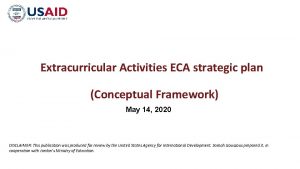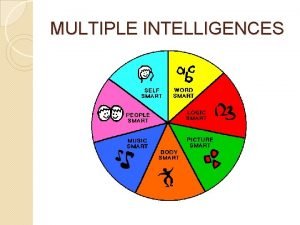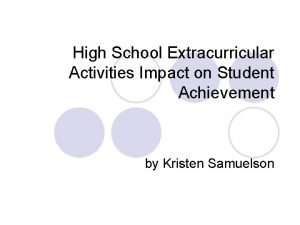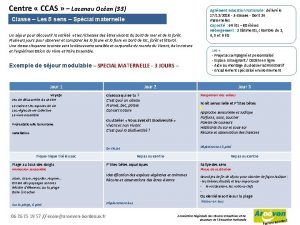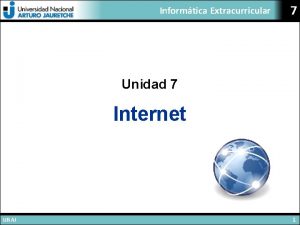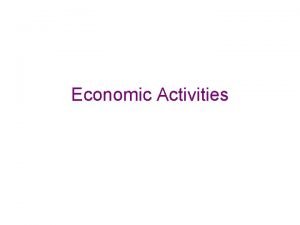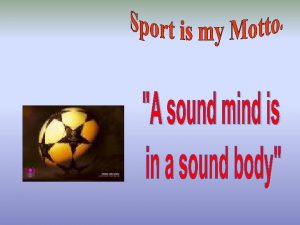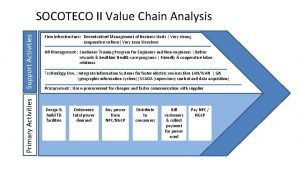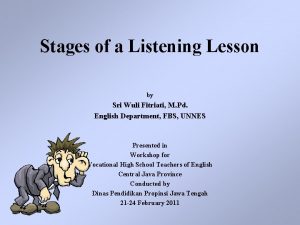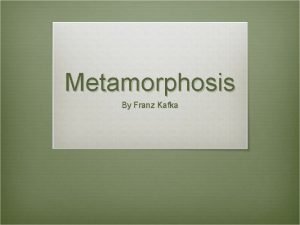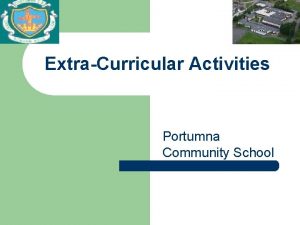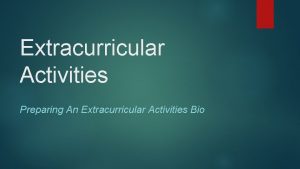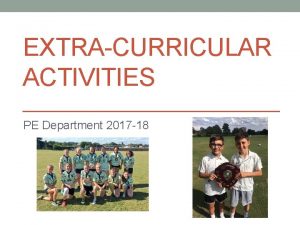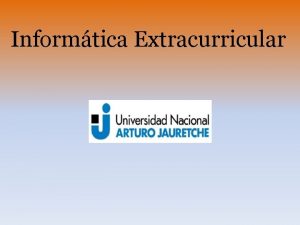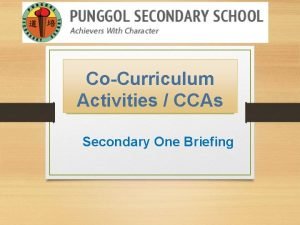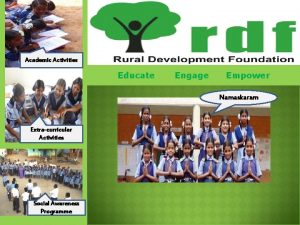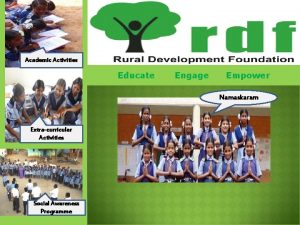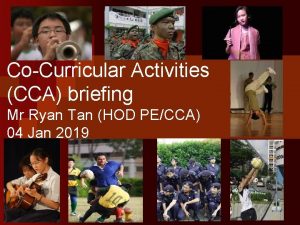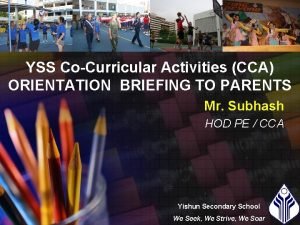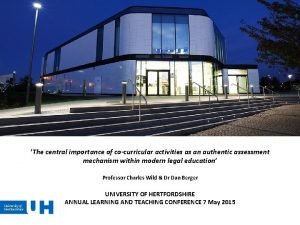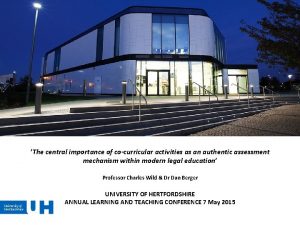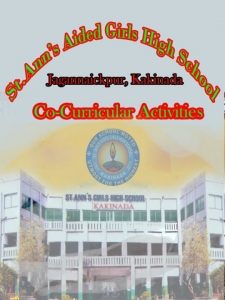COCURRICULAR EXTRACURRICULAR ACTIVITIES COCURRICULAR EXTRACURRICULAR ACTIVITIES l CCAs

















- Slides: 17

CO-CURRICULAR & EXTRACURRICULAR ACTIVITIES

CO-CURRICULAR & EXTRACURRICULAR ACTIVITIES l CCAs and ECAs are activities that education organizations create for school students. They serve to promote a variety of activities which all school students should attend alongside the standard study curriculum. Such activities are believed to provide all level learners with the opportunity to develop initiative, leadership and responsibility. They play a significant role in the total educational development of children and teenagers. These programmes channel the interests and talents of learners into positive efforts for the betterment of themselves and the community as a whole.

Co-curricular Activities l Co-curricular activities form an important part of the academic curriculum. They are mostly held inside the classroom. They are teacher-oriented activities. The teacher monitors and guides the special efforts which are made to tap the talents of learners.

l What can be done in an English class to enhance the learning experience?

Arts and Crafts l Using arts and crafts in the classroom can be an excellent way to facilitate language learning with young learners. For mixed age and level classes, arts and crafts activities can supplement a course book which isn't always appropriate for all students. It's useful to show students an example of the end product. They will then have a clear idea of what they are going to make.

Project Work l Project work is becoming an increasingly popular feature within the ELT classroom. Common projects are class magazines, group wall displays about students' countries and designs for cities of the future. A project involves students in deciding together what they want to do to complete a project whilst the teacher plays a more supporting role

Some advantages of project work are: l l l - Increased motivation would make learners become personally involved in the project. - All four skills, reading, writing, listening and speaking, are integrated. - Autonomous learning is promoted as learners become more responsible for their own learning.

l l l - There are learning outcomes, learners have an end product. - Authentic tasks and therefore the language input are more authentic. - Interpersonal relations are developed through working as a group. - Contents and methodology can be decided between the learners and the teacher and within the group themselves so it is more learnercentered. - Learners often get help from parents for project work thus involving the parent more in the

l l l - Learners often get help from parents for project work thus involving the parent more in the child's learning. If the project is also displayed parents can see it at open days or when they pick the child up from the school. - A break from routine and the chance to do something different. - A context is established which balances the need for fluency and accuracy.

Portfolios l These are a great way to help students review what they have done over the term or year, organize and assess their work. The students choose a certain number of pieces of work they want included in the portfolio.

Extracurricular Activities l Extracurricular activities are mostly held outside the classroom. They are student-oriented activities. The involvement in extracurricular activities helps learners discover and share talents, develop character and competence. There abundant opportunities for students to get involved in a rich array of extracurricular activities outside the classroom, to explore their passions and interests. These activities are an integral part of student life, reflective of the school’s commitment to not only intellectual growth, but to the development of each individual’s creative, social and emotional wellbeing as well.

Extracurricular activities include: l l Trips : Excursions might be a nature walk around the neighbourhood, visit to the zoo, the Kuwait Towers, the Entertainment City, The National Museum, Water Plant or The Scientific Centre …etc.

Parents in the classroom: l Curriculum is enriched each year by parents who volunteer to bring their expertise, talents and passions to the classroom. Occasionally, a parent-guided project may be tied to a unit of study; other times, it might simply be an enriching experience for the learners. In all cases, teachers work with parents to make the activity timely, educational and age-appropriate. E. g. a doctor’s presentation on the human body and senses; an artist’s instruction on primary and secondary colours; a chef‘s demonstration of culinary skills ; a poet or an author’s reading.

School assemblies: l Children and teenagers participate on a regular basis in school morning assemblies. Programmes include the national anthem and the school broadcasting in which learners show their talents and interests. Talents are also shown through sport activities.

School competitions: l Participants voluntarily take part in different competitions such as story telling, letter writing, reading, survey, drawing, poster making and oral fluency …etc.

Student council: l Student council is composed of elected students from different grades. Elections are held each year to give more students a chance to build their leadership skills. The student council participates in various community service activities.

Conclusion: l Teachers and school administrations have to think seriously and plan for their cocurricular and extracurricular activities since they undoubtedly benefit the student’s academic achievements and they develop the learners’ autonomy and effectiveness. Schools should encourage students to participate in extracurricular activities because they help in a great deal.
 Extracurricular activities conceptual definition
Extracurricular activities conceptual definition Extracurricular activities examples
Extracurricular activities examples Howard gardner learning styles
Howard gardner learning styles Operational definition of extracurricular activities
Operational definition of extracurricular activities Ccas anesthesia
Ccas anesthesia Ccas lacanau
Ccas lacanau Satec assurance ccas
Satec assurance ccas Ccas villeparisis
Ccas villeparisis Ccas lacanau
Ccas lacanau Proiect educativ
Proiect educativ Informatica extracurricular unaj
Informatica extracurricular unaj Proiect extracurricular
Proiect extracurricular Examples of primary activities
Examples of primary activities Operating activities vs investing activities
Operating activities vs investing activities How do you find these activities
How do you find these activities Primary and support activities
Primary and support activities Pre listening stage
Pre listening stage The metamorphosis setting
The metamorphosis setting
